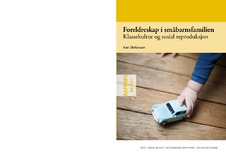Foreldreskap i småbarnsfamilien
Report

Åpne
Permanent lenke
https://hdl.handle.net/20.500.12199/3366Utgivelsesdato
2011Metadata
Vis full innførselSamlinger
- NIBR notat [1018]
Sammendrag
This thesis explores the relationship between the social institution of parenthood and social class. The aim is to contribute to the evolving international field of qualitative research on this topic, more specifically to the ongoing discussions on the following questions: How is class enacted through parenthood, and how does parenthood contribute to the reproduction of class? The thesis includes five published papers. Paper I describes and discusses key studies on parenting and social class, while papers II-V present empirical analysis based on qualitative interviews with parents in two class contexts; the working class and the middle class (total sample of 58 families).The thesis departs from two perspectives – on parenthood and class respectively. With reference to Morgan’s work on family practices, parenthood is studied as situated practice. Inspired by the works of Bourdieu, class is studied as an «objective» structure for social experiences, that works to produce and reproduce classed ways of being in the world. The empirical papers explores different aspects of parenthood in families with pre-schoolers; the organisation of care (paper II), interaction between parents and children (papers III and IV), and parents’ interactions with the institution of formal daycare (paper V). All in all the papers confirm the picture outlined in previous research: parenthood in different classes unfold as distinct cultural dynamics. The thesis’ main contributions can be summed up as follows: First, it identifies family policy measures as key components in classed care projects in welfare states such as the Norwegian. The second, and in my view most important contribution, is the theoretical model outlined in the concluding section. The aim of this model is to provide theoretical linkages between children’s contexts of experience, i.e. the distinct social worlds that middle-class and working-class parenthoods generate, and parents’ class experiences, and hence to contribute to the theoretical understanding of how parenthood reproduces classed habituses. Denne avhandlingen handler om foreldreskap, klassekultur og sosial reproduksjon avgrenset til to klassekontekster – «middelklassen» og «arbeiderklassen». Det empiriske grunnlaget er kvalitative intervjuer med småbarnsforeldre. Analysene viser at foreldre i ulike klasser har ulike oppfatninger om små barns behov, og hva som inngår i foreldreansvaret. Forskjellene bidrar til reproduksjonen av klasse. Resonnementet går slik: ulike foreldreskap genererer distinkt forskjellige erfaringskontekster for barn. Gjennom aktiv deltakelse i disse, erverver barn måter å være i verden på, som er dypt preget av klasse. Årsaken er at barns erfaringskontekster speiler foreldrenes klasseerfaringer, nærmere bestemt det rommet for selvutfoldelse som har vært tilgjengelig for dem.